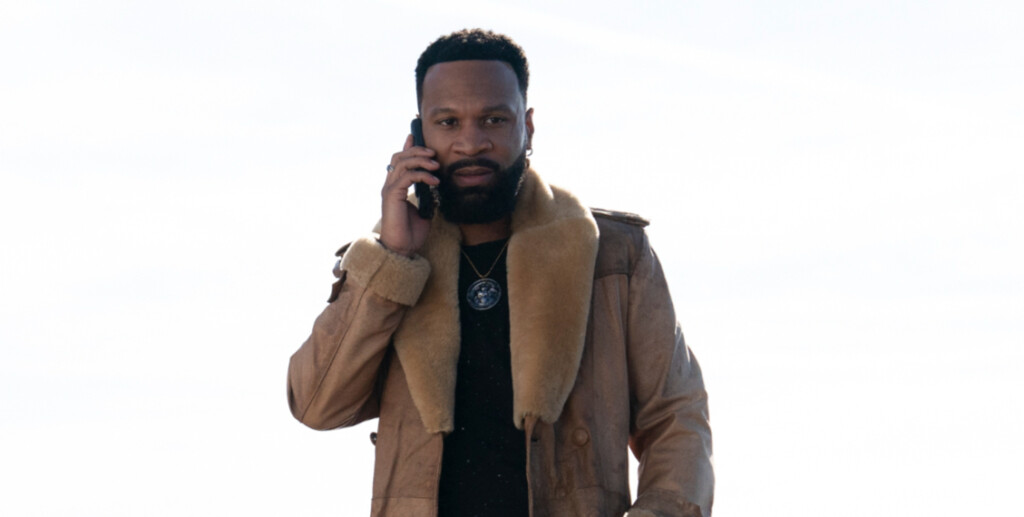Johnny Ray Gill delivers a chilling performance as Bobby Trey in Prime Video’s Cross, a series based on James Patterson’s acclaimed Alex Cross novels. The hit show retains core elements and faithfully captures Alex Cross as Patterson envisioned while reimagining much of the narrative with fresh twists and unexpected moments.

Currently the #1 series in 116 countries, Cross introduces Trey, an accomplice behind the central serial killer’s deadly plans. Trey is a disgraced police officer with a tarnished reputation, navigating a world of corruption and criminal enterprise.
Leveraging his background in law enforcement, he has become a “fixer,” using insider knowledge to help powerful figures evade legal and ethical consequences. Trey’s willingness to cross any line—including murder—makes him a complex and layered villain.
In an exclusive interview with The Quintessential Gentleman, Gill explains the complexities of Bobby Trey, the nuances of playing a villain, and the cultural authenticity Cross brings to life.
Transcript edited.
QG: When you were filming Cross, did you feel like, “Oh yeah, this is the one,” or, “This is going to hit”?
JRG: No, because if you’re in that feeling, you’re too far in the future. I think you need to stay in the moment and the present. So many things can happen between filming a show, editing, and what the network decides. There are plenty of things we think will resonate with an audience that don’t, and then there are surprises that connect in ways no one anticipated. I focused on the character, building rapport with the cast, and honoring Ben Watkins and the writers’ words.
QG: What drew you to be part of this project?
JRG: Ben [Watkins] sent me the script while I was at the Austin Film Festival. He said, “Hey, check this out; I’ve got a character I wrote with you in mind.” But honestly, what hooked me wasn’t even my character. There’s a dinner scene in the opening episode about police brutality and the duality of being a police officer. That conversation was so nuanced, not the usual oversimplified dialogue you see in Hollywood. When I read the term “peace officers” in the script, I was stunned. I knew I had to be part of this.
QG: Bobby Trey, your character, is complex. What stood out to you about him when you first read the script?
JRG: The description that stuck with me was, “He fake smiles all the time and is motivated by money.” I wrote in my notes, “Bobby Trey is capitalism personified.” I wanted to exhibit the charm of capitalism, and the viciousness and brutality of it. Bobby Trey is a former detective, and I wanted to infuse him with violence, charm and money-seeking.
QG: Are there any similarities between you and Bobby Trey?
JRG: [Laughs] He liked to dress now! I think Maxwell was in my head when I was seeing certain stuff. Lenny Kravitz. But again, that’s that dichotomy, this fact that somebody can be as murderous but also my jeans got to fit right, like quintessentially, it’s got to be beautiful. I think that’s probably the closest thing.
That was another thing that really got me into the character of Bobby Trey, he wore a lot of cowboy boots…wore a lot of platform shoes and stuff like that. I never really rocked that kind of style before. So before we started filming season one, I went to one of the little thrifts, found me some fly cowboy boots and was walking around with the joints.
QG: Did you enjoy playing a villain?
JRG: It’s interesting you almost said “victim” instead of “villain.” I think Bobby Trey is a victim of systems. Playing a villain is fun, sure, but it also comes with a residue. I don’t like guns. I’m deathly afraid of them. So to have to tap into the fact that Bobby Trey is shooting sniper rifles that can fold up and go into backpacks. Johnny Ray is like whoa, “This isn’t cool.”

QG: You come from a theater background. Why is that a good transition to the silver screen?
JRG: Theater is where you learn how to act and how to do a full-body performance. Acting is about conveying the human experience, and the human experience isn’t just in the face, It’s in the entire body.
QG: How do you feel about the authenticity of Cross, especially in portraying DC and Black culture?
JRG: So DC plays do through this show or through this character without DC playing a real role. It was even educating for me because I haven’t spent a lot of time in DC. It [cultural references] matters and so often Hollywood takes for granted how much that stuff matters for us. There will be infinite nuances for other folks but then for us it’s just we’re in DC and maybe a Black person will walk past. The authenticity is incredibly important and then to do it on such a prestige show like Cross, you’re just blending all the things and you’re bringing all the layers to the table. This show is like a sexy pot of gumbo.
QG: How was it working with the cast, especially reuniting with Aldis Hodge?
JRG: it’s beautiful for me and Al to have shared such career closeness. Underground was a beautiful show… we also actually played brothers on Rectify. So to be working again on a project is a blessing. The rest of the cast is amazing.
QG: What advice would you give to aspiring actors who haven’t had their big break yet?
JRG: It’s a marathon and the faster you understand that, the faster you’ll take the pressure off yourself. Just let it happen.
QG: What’s next for Johnny Ray Gill?
JRG: Season two, I’m not sure when we dropping but it’s on the way. In 2025, I got the album coming; we’re gonna be releasing some music and a book of poetry. So I got some things on the horizon.
Check out the full interview.
Photo Credit: Prime Video



